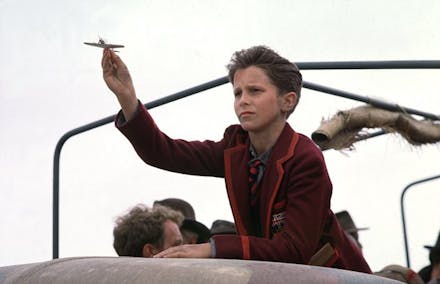Empire Of The Sun could be called Spielberg's mid-life crisis movie. Of course, he'd made a serious bid for cinematic adulthood before, with The Color Purple, but the reviews hadn't been as glowing as perhaps he'd imagined. Spielberg couldn't win; he wasn't the boy who wouldn't grow up — he was the boy who wasn't allowed to grow up.
Spielberg was 40 when he made Empire Of The Sun, and he was tired with the image he'd built for himself. Interviewed in 1987, he admitted to a certain ennui and actually voiced some of the doubts that others had expressed about him. Aside from his directing work, Spielberg was overseeing a vast number of projects that weren't quite working and the strain was showing. "I'm tired of producing," he said. "I can't eat any more candy or it will ruin my health."
Empire Of The Sun, however, was not a personal project from the outset. J.G. Ballard's autobiographical novel was brought to his attention by David Lean, who wanted him to produce — but when Spielberg bought the rights, Lean dropped out. Secretly, Spielberg was pleased. He was looking for something that reflected his new, restless and uncertain mood, and with Ballard's novel, he'd found it.
It begins in 1941, where wealthy Europeans are living in luxury in occupied Shanghai. For the pampered few, the war is an abstract threat. The first character we meet is 11 year-old Jamie Graham (Bale), a spoiled British schoolboy whose parents live in a privileged upper-class neighbourhood. History tells us that all is not well, the Japanese army is planning its assault, but Spielberg ekes out the tension with uncommon detachment. Despite a cast of thousands and a wealth of special effects, Empire is perhaps one of his most economical endeavours using visual rhymes, metaphors and wide, unblinking shots in place of his usual wizardry.
"Ever since Duel," he said, "I've been looking for a visual narrative — a story that could be told nearly exclusively through visual metaphors and non-pretentious symbolism."
Spielberg's thinking is palpable in the film's mood, which breaks with the tradition of his earlier movies. Although the world is seen through a child's eyes, this is a whole new perspective. In E.T., filming from waist height, Spielberg showed the world as huge, daunting and exciting. In Empire, however, he reworks this dynamic. The child is marginalized, dwarfed and unimportant. In a key scene, Jamie attends a fancy dress party, dressed as an Arabian prince and the aeroplane-fixated child stumbles on a crashed jet where he acts out his fantasies of war. Moments later, he stumbles on a real Japanese war unit — a silly, childish sight in his bright orange turban.
Although its message is ultimately one of hope and survival, Empire remains one of Spielberg's more pessimistic movies. Returning to the recurrent theme of divorce and loss, Spielberg shows Jamie being separated from his parents at the outbreak of hostilities. Venturing out into society, he still believes he's special, dropping names and naively asking for his parents, as if the hoi polloi of Shanghai should actually know them. Could this be an ironic reflection on Spielberg's own perceived wunderkind status?
From here, Empire becomes a rites-of-passage movie unlike any other Spielberg movie. There is no redemptive, heaven-sent "magic" that will intervene, and Jamie winds up in a POW camp where two distinct father figures vie for his conscience. Will it be dodgy mentor Basic (Malkovich) or the proud, prim Dr. Rawlins (Havers)? The shattering of childhood dreams is taken as given. Jamie renounces Christianity, but his faith is restored when he thinks he has seen a woman's soul going up to heaven in a flash of light. Days later, he learns that this blinding vision was actually the bombing of Nagasaki.
An unashamed child of the 40s, Spielberg is using this film to exorcise some of his youthful obsessions. As a child, his early 8mm films dwelt on war and destruction, and like the young Spielberg, Jamie comes to learn the difference between myth and reality. Shots of Graham's toy plane cut to ominous images of Japanese bombers on their way to war. Re-christened Jim, he reinvents himself with a humility and a street savvy that suggest, ultimately, Empire is not about redemption so much as respect and how to earn it. After his fall from grace, the boy's life starts afresh when he returns to the camp after a dangerous mission. The salutes that greet him hark back to Spielberg's own quest for respect.
Despite some lapses into Uncle Sam jingoism, and an ill-advised score, Empire is one of Spielberg's most fascinating films. An indication of the work he can do with a strong script (by Tom Stoppard), it's an important transition to the darker worlds of Schindler's List and Saving Private Ryan. He may not have pulled together the broader issue that Ballard's book raises — the contradictions of war, class, society — but he did create an extraordinary film about growing up, reflected in Jamie's transformation from a privileged mummy's boy to a self-sufficient Herbert whose eyes have seen so much he fails to recognise his own parents.

